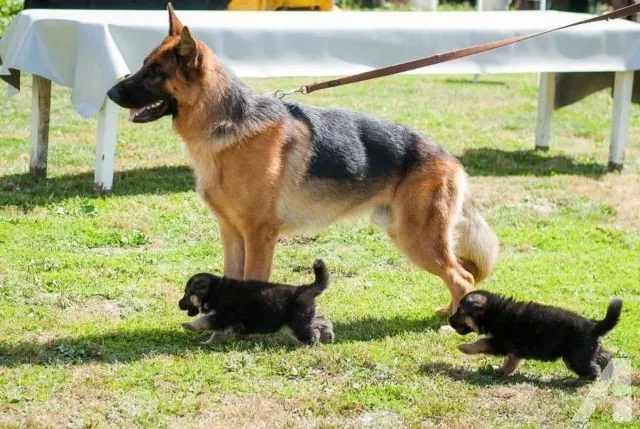German Shepherd Teeth: German Shepherd puppies are the cutest little creatures on earth. When you are getting a young German Shepherd puppy, you have to look after it like a toddler.
And in light of this comparison, one of the things you have to deal with is your German Shepherd teeth.

Your German Shepherd Puppy begins to lose its teeth in order to enlarge 42 adult teeth. It is possible to make sure that you are easy on a small puppy as it can be uncomfortable and confusing to the puppy. Let’s start by covering all the basics of the German Shepherd’s teeth and teeth process:
German Shepherds have different types of teeth – mainly incisions, fangs, molars and premolars, and a large carnassial tooth.
German Shepherd Dogs are predators and teeth that represent history and changes in the way they eat.
Fangs are required to hold and puncture, cuts for nibbling, premolars for tearing, and molars for bones to crack. And all of them need to be sturdy, reliable and healthy.
German Shepherd Teeth features
You may not see the puppy lying around, but there are obvious signs that your puppy is gnashing teeth. A toothed puppy can eat less than usual and chew toys and other items more than usual. You may notice a small amount of blood on your dog’s toys and even at places where you can chew and play.
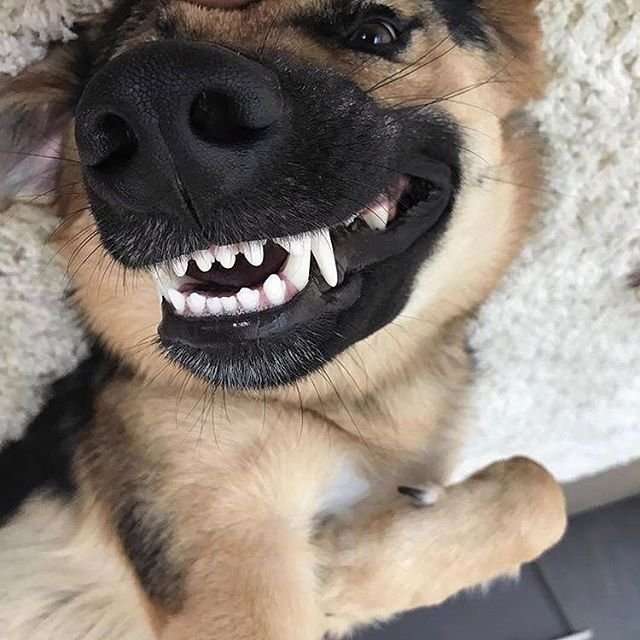
German Shepherd Teeth Oral Care
Even if your puppy brushes his baby teeth, it is important to start looking after your dog’s teeth as soon as possible. Start by brushing your puppy’s lips and brushing its gums and teeth.
Do this frequently to make your puppy accustomed to putting one’s hand in his mouth. You can use a dog’s toothbrush on peanut butter or cheese thorns to enjoy the puppy teeth. Do not use human toothpaste to brush your dog’s teeth, but go for the best dog toothpaste.
Also Read: Pitbull Breeds & Types of Pitbulls – A List of Every Pitbull
Supply plenty of rubber and raw bones for your dog to chew on. Chewing dog bones helps a puppy to reduce its tooth discomfort, clean its new teeth and refrain from chewing furniture and other household items.
Go Beyond Brushing
If you do not like or dislike brushing your dog’s teeth every day or two, look for another option such as special dental chews or food / water additives. Not all products are equally effective (and none work as well as tooth brushing), so ask your vet for recommendations.
The dental chew should be easily digestible and suitable for size. Generally, dental chewing should be given daily to be effective and your dog should chew them for a while before swallowing.
Food supplements are used on a daily basis. If you use water additives, be sure to change the water daily or according to the Vet instructions.
German Shepherd teething process – what are the teething stages?
Let’s start by saying that German Shepherd adults have a variety of teeth – mainly fangs, incisions, molars and premolars, and a large carnassial tooth.

Puppies usually grow all of their puppy teeth by the age of 6-8 weeks, and they begin the tooth process at this time, which inevitably loses their puppy teeth and gets a full set of adult teeth.
Puppy dogs and incisions (large teeth in the front of the mouth) are usually in full force at the age of 6 to 8 weeks, and permanent adult dogs and incisions are up to 3 months old.
Permanent molars, premolars, and large carnassial teeth are usually 4-6 months old – they can grow because puppies do not have molars.
Signs to keep an eye on during your puppy teething
It can vary somewhat between breeds, and there is progress you can expect as your puppy develops new teeth.
It is important to start maintaining your puppy’s mouth at an early age so you can check for any dental problems from time to time.
Signs of oral discomfort include any kind of facial swelling, changes in eating habits, unexpected unexpected night wakes or face massage.
You may want to take your puppy to the vet if you see:
- Two teeth occupy a space in your puppy’s mouth. This can cause the adult tooth to become crooked, which can then cause problems.
- Blood stains on your dog’s toys, brown tartar on teeth, or bleeding, inflamed and / or sore gums. These are common symptoms of periodontal disease, a major oral problem in dogs.
- Cracked teeth. It exposes the tooth nerve itself, causing your dog pain or infection.
- Crooked teeth or malocclusion (misalignment of the upper and lower jaw). Although some species have trademark bites, unusual ones can cause chewing problems.
- Loose adult teeth. Most often, it is caused by injury to the mouth or damage to the gums due to advanced periodontal disease. It can also be a sign of illness.
When do German shepherds stop teething?
So, When it comes to German Shepherd Teeth, your GSD puppy will usually complete the first and major stages of the tooth in about 4-6 months.
Unlike humans, the puppy swallows fallen teeth or they fall to the ground.
German Shepherd tooth toys & goods for handling chewing & biting
Dog may experience a little pain and discomfort during toothache, especially in the gums.
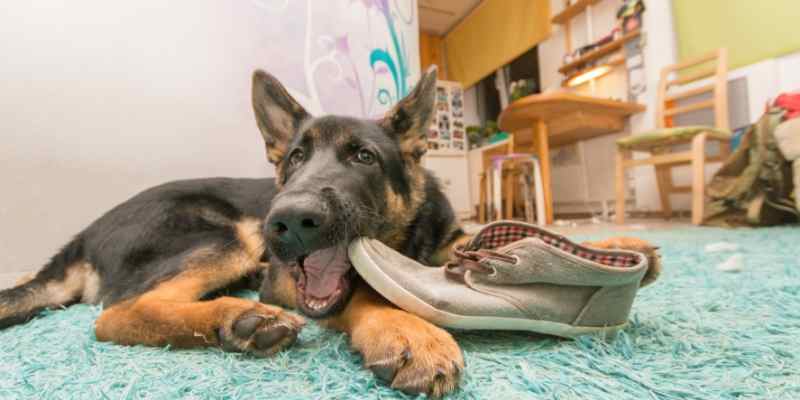
This, and the fact that they are still puppies, leads to the infamous German Shepherd puppy chewing, biting and mouthwatering.
At this stage, you want to start obedience training to reduce bite behavior, but you also want to give your GSD items a chew so they don’t chew you or your household goods.
Taking Care of Your German Shepherd Teeth
Exercise Your Puppy Regularly – This is one of the most common causes of chewing, eliminating boredom
Give your GSD puppy wet towels that you put in the fridge or freezer (make sure they’re not too hard – hard objects can damage the teeth. Soft and wet/cold are aimed at you) – they like to chew and you can flip them.
- Give old socks and shoes to chew on
- Soft ropes are great
- Give them dog toys or Bone
- If chewing is really bad, crate them for a short time
When do German shepherds stop biting and chewing?
You should notice that the puppy’s biting and chewing stops significantly during the 6 months after the tooth is finished.
However, keep in mind that a German Shepherd will reach maturity at 15 months to 2 years of age, so you may notice some remnants of puppy behavior up to this point.
It is important to train your dog to chew the things you give and also to make sure your dog would understand that hard biting would cause pain to humans.
German Shepherd Puppy proofing your home
Your German Shepherd Puppy wants to chew everything in its range to distract itself from the tooth properties. Here are some tips to protect your puppy and your belongings at home:
- Keep your cleaning supplies and medicines in a safe storage area.
- Cover the exposed cables within the scope of your GSD puppy, as the wires are at risk.
- All human foods, especially chocolates and grapes, should be avoided by your GSD puppy because they can be toxic to your tooth puppy.
- Use taste-resistant sprays on off-limits furniture legs, such as tables, chairs, desks, and beds. These ingredients are bitter or spicy hot. Dogs generally do not like these tastes.
- Monitor closely when your puppy is loose at home. You can also designate a chewing area in your home.
If you can’t see your puppy, use a safe crate or pen area so he can chew everything.
Although teething can be challenging for you and your puppy, it is a simple process because it is a sign that your German Shepherd puppy is growing. Keep in mind that teething is just one step and it goes beyond that. Apply the above tips so that both of you can keep your sanity intact.
Also Read: Is a German Shepherd the right dog for me? Guide to choosing the right german shepherd.
What to Do If Your Dog’s Teeth Are Worn Down
This is the most common question from the adult dog owners, especially about teeth worn down. What causes tooth worn, and what should you do about the teeth worn-down on your pet?
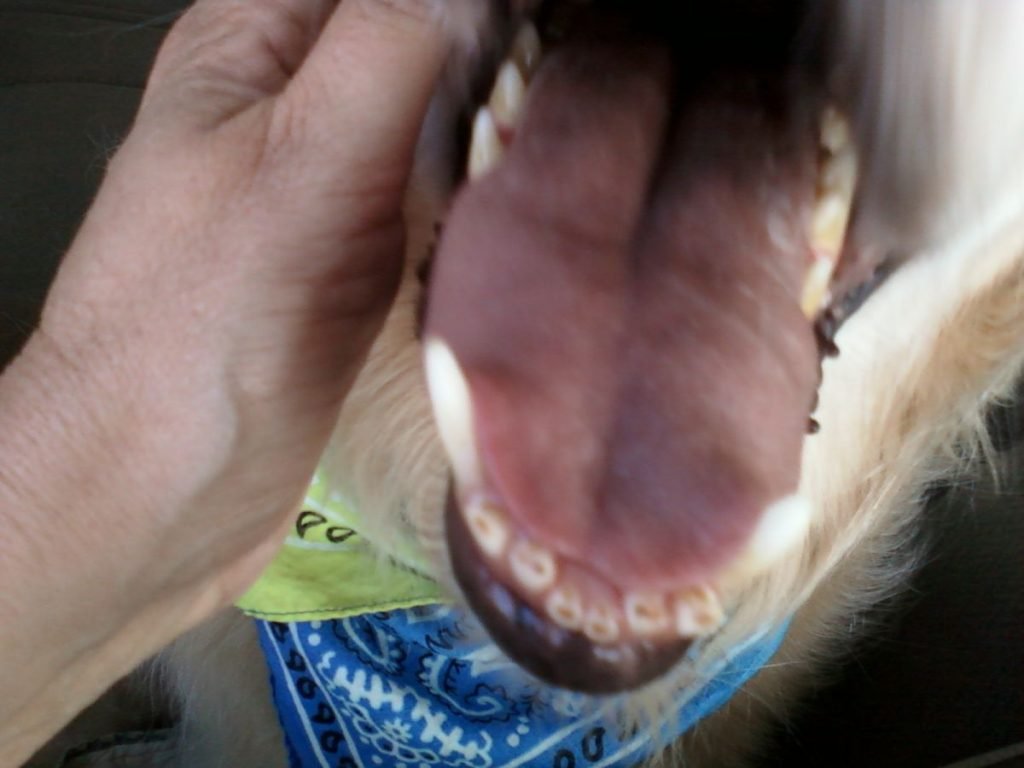
The worn teeth are usually dark in color, strangely shaped and / or worn to the gum line. The most commonly affected teeth are incisions and canine teeth-incisions small teeth in the front of the mouth, and fangs “fang” teeth.
How teeth are worn-down
By brushing each other’s teeth (a malocclusion or “bad bite”), by chewing on a pet’s fur and skin (similar to itchy allergies), or by chewing on a pet (pet toys, bones, sticks, stones, etc.).
How quickly this happens
This change usually occurs gradually and the teeth respond by placing extra teeth to harden the injured area. In these cases, the teeth are usually isolated, unless they are painful or the gum is infected.
When to approach a doctor?
In the event of a sudden wear or tear caused by chewing, your pet should be examined immediately by your veterinarian.
Depending on the nature and extent of the dental injury, your vet may choose to remove the tooth or perform endodontic treatment, also known as a root canal.
Reaching the source of the problem
In most cases your veterinarian may want to do dental radio graphs even if your pet does not show signs of infection or discomfort. Radio graphs rule out a “dead” tooth that looks neat on the outside but is not significant on the inside, causing later problems.
Toothache in dogs is so subtle that it also eliminates exposing your pet to toothpaste causing hidden pain.
How to prevent your dog from getting dental problems
From time to time, your veterinarian may recommend professional dental cleaning. This requires general anesthesia.
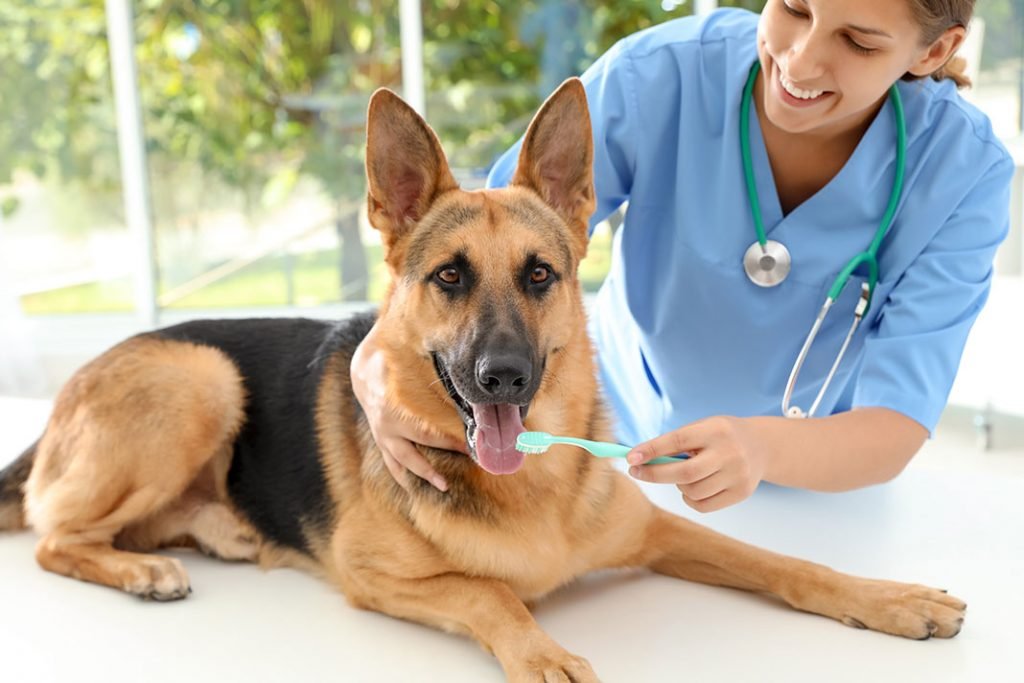
During the procedure, your dog’s teeth and gums will be closely monitored for problems. Teeth are scaled and polished to slow the regeneration of tartar.
While some dog groomers offer a dental cleaning service, do not expect deep cleaning. They can brush dog teeth as much as you can at home, but for a thorough, complete cleaning, the teeth should be cleaned under the gumline.
This is not something that should be done while the dog is awake.
If your dog has periodic illness or other dental problems, the vet may need to remove the affected teeth or refer you to an oral surgeon.
Some dogs need dental cleaning once or more a year, while others may go longer. Strictly follow your vet recommendations.

